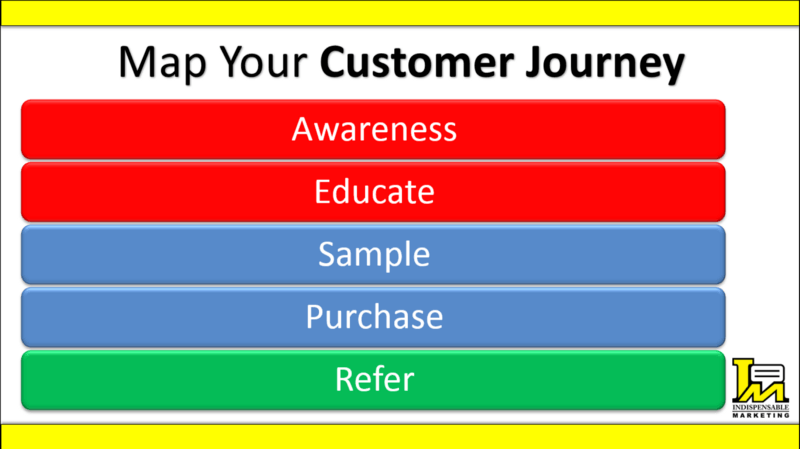How to Define Your Ideal Customer in 4 Questions
In any marketing conversation (or one that you hope to be effective) it’s common to hear that you must know your target market. What bothers me most about this simple target market approach is that it still allows small businesses to chase anyone who has a business card.
Instead, it’s important that you develop an understanding for who your ideal customer is within that target market, and start building every aspect of your marketing, sales, and service around attracting and serving them.
This thought process led me to create this post about how to define your ideal customer in four questions, which ties together characteristics (sometimes defined as demographics), psychographics, behavior, and desires.
Answering these customer profile questions from the beginning and during the growth of your business will save you tons of time going in circles trying to be all things to all people.
1. What do they look like?
Defining your ideal customer starts with things like: Demographics, Psychographics, and Challenges or Problems.
These are the kinds of things you start with, but you must narrowly define these even further or you’ll just be going after any partially defined customer who has a business card in your target market.
- Demographics – Business2Business (B2B) demographics could be the type of industry, the job title of that individual, the years that a company has been in business, and/or revenue levels. Business2Consumer (B2C) the demographics could be age, sex, illness, income, and a particular area of town.
- Psychographics – Understand where do they hang out, what do they read, what do they listen to, what do they search online, what makes them tick, what triggers them to go looking for a solution
- Challenges or Problem – Marketing is about solving customer problems, whether those are problems customers are currently facing, or problems they will face as their marketplace evolves and their needs change.
2. What are their problems?
No matter what you sell — a product, a service, a subscription, etc. — you’re selling a solution to a problem … and people are looking to get their problems solved.
The business owner who can understand the problem the best is most likely the one that gets the business. In almost every case, the act of solving problems should be the primary focus of any engagement with a prospective customer.
A recent survey found that 80% of buyers don’t believe that the salespeople they deal with understand their business.
74% of B2B buyers choose the salesperson who was first to add value and insight in their buying process.
Clearly, insight into the problems customers are having is key because very few people want what you sell. That’s not a blow to you or your business or your solutions. I’m sure all are remarkable. People want what they believe they will get, achieve, relieve, dodge, or acquire based on buying what you sell.
For example , a lot my firm’s prospective clients might say things like — I just want my phone to ring, I want to be on the first page of Google, I want more referrals, I want less marketing headaches, I want my website to generate leads, I feel like I’m wasting money on ineffective marketing, etc.
So my firm doesn’t sell strategic marketing or marketing plans or even consulting — all my ideal clients need to know about what we do is:
- We make the phone ring — end of story.
- We get you on the first page of Google — end of story.
- We make more referrals happen — end of story.
- We make marketing headaches go away — end of story.
- We make the website generate leads — end of story.
- We make marketing dollars go to work — end of story.
Another example, a massage practice: They might have the best tables, oils, and most highly skilled therapist but all their customers seem to care about is that their pain and discomfort go away.
So, that’s the promise they need to communicate, shout about and promote. The rest is an expectation — I mean doesn’t everyone in the massage business have highly skilled therapist.
3. How do they want to be served?
What I’m really asking you here is to understand the demands and expectations an ideal customer has first and then discover ways to address those through the interactions they have with your business.
Do ideal customers go all in immediately on everything they buy or are they always looking for a trial offer? Do they attend educational conferences or rarely leave the building? Do they value delivery of information electronically or prefer direct mail? Do they enjoy frequent communication or quarterly communication?
This process starts with viewing your business in 5 stages and discovering how you will move your prospects from awareness of your business/solution, to educate them on the benefits/problems you solve, to sample your expertise/solution, to purchase your core offering, and refer others to your business.

Nothing matters more to a business than how it interacts and services a customer during their experience with that brand. How the customer feels will determine whether your business survives or sinks. The secret to every business organic growth is great customer experiences, not the marketing done in the pages of a magazine, newspaper, trade publication, on TV, social media post or other media outlets.
4. What do they think value is?
“Value is in eyes of the beholder,” so to speak. The difficult part of this question is remembering the beholder is not you. It is your ideal customer. You must come to understand how ideal customers think and determine what value is.
If you want to succeed in business, you must find a way to showcase a differentiation in a way that ideal customers want and value. Quite often your clients value the little things you do that are special.
Interviewing customers is a great way to get insight into what they think value is.
What kind of question should you ask customers? Get started with this one:
What’s the one thing we should never stop doing?
Find out what your customers really value about you, your services/products and your company. This question lets you discover your true differentiator. Is it your friendly staff, the way they get results, your process approach, your 24-hour responsiveness or the way you clean up after every job?
If you try to be all things to all customers, you are sure to fail. The biggest struggle I see small business owners have is deciding who matters. You must spend time narrowly defining what your ideal customer looks like before proposing any tactics aimed at lifting sales.





